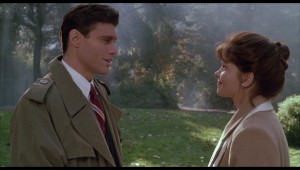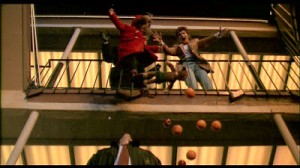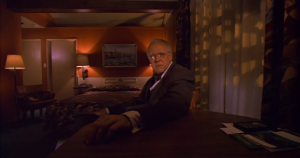I’m of two minds about Brian De Palma’s Raising Cain (1992), thanks to
Arrow Video’s spiffy three-disc dual format edition—specifically, about
what’s called Raising Cain: The Director’s Cut on disc #3 (“limited edition
Blu-Ray exclusive”), “a De Palma-endorsed recreation of the film by Peet
Gelderblom, re-ordered as originally planned”.
One of my minds agrees with Gelderblom that this is a
(slightly) more satisfying edit of a film I reviewed in the
Chicago Reader as follows: “Brian De Palma’s 1992 thriller
perform stylistic pirouettes around a void, it’s full of sleek
and pleasurable moments. If I’m right about the story,
which is mainly composed out of loose pieces of Psycho
and Peeping Tom, a warped child psychologist (John
Lithgow) kidnaps his own granddaughter to avenge the
adultery of his son’s wife (Lolita Davidovich), and
frames her lover (Steven Bauer) for the crime. But
maybe I’ve got it all wrong and it’s the son’s evil twin
who’s doing the kidnapping; Lithgow also plays this
character, along with the son and other personalities
too numerous and obscure to fathom. Produced by
De Palma’s wife Gale Anne Hurd (The Abyss); with
Frances Sternhagen, Gregg Henry, Tom Bower, and
Mel Harris. R, 91 min.”
The other mind of mine says, “Wait a minute: Both versions of
Raising Cain are sleek and pleasurable, but only if you agree
that the genuine passions underlying Psycho and Peeping Tom
are inessential appendages to their status as mindless
entertainments, and that De Palma’s ingenuity largely consists
of how many narrative and stylistic elements from the two
pictures can be welded together into a single mechanism.The
grotesque phoniness of De Palma’s slow-motion sequences in
both versions and the irrelevance of the characters’ behavior
to recognizable human beings as opposed to generic props are
parodies of such passions, delivered not as artful
expressiveness of any kind but as cynical sops to our standard
genre expectations. And all the extras in the world (and those
on discs #1 and #2 come close to this exhaustiveness, including
interviews with half a dozen of the film’s actors, but none with
either Lolita Davidovich or De Palma) can’t compensate for
this lack of genuine passion, even while it provides plenty of
old-fashioned jolts, swerves, and bends, like those of a theme-
park ride. All of which encourages me to conclude that insofar
as one can legitimately distinguish between entertainment and
art, something Pauline Kael was generally reluctant to do,
Raising Cain is an excellent example of entertainment,
not art. “ Nuff said. [2/19/17]




